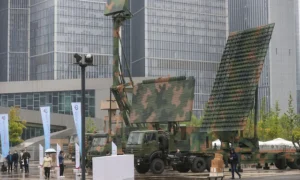
CANBERRA, Australia — The Australian government announced Friday it has decided not to cancel a Chinese company’s 99-year lease on the strategically important Darwin Port, despite U.S. concerns that the foreign control could be used to spy on its military forces.
The Department of Prime Minister and Cabinet said it decided after an investigation of the 8-year-old lease that current monitoring and regulation measures are sufficient to manage security risks for critical infrastructure, such as the port in the northern garrison city of Darwin.
“Australians can have confidence that their safety will not be compromised while ensuring that Australia remains a competitive destination for foreign investment,” it said in a statement.
Landbridge Industry Australia, a subsidiary of Rizhao-based Shandong Landbridge Group, signed the lease with the debt-laden Northern Territory government in 2015. That was three years after U.S. Marines began annual rotations through Darwin as part of the U.S. pivot to Asia.
The United States has raised concerns that Chinese port access in Darwin would enhance intelligence gathering on nearby U.S. and Australian military forces.
Landbridge said in a statement it hopes the decision will end security concerns.
Prime Minister Anthony Albanese’s center-left Labor Party was in opposition at the time, and he had argued the lease should never have been allowed due to security concerns.
After Labor won elections last year, Albanese directed his department to investigate whether the lease should be changed or canceled.
The Australian decision comes before Albanese flies to Washington, D.C., next week to meet President Joe Biden. Albanese also plans to soon become the first Australian prime minister to visit China in seven years.
Neil James, executive director of the Australia Defence Association think tank, said regulation cannot solve the security risk posed by Chinese control of the port.
“Our problem is going to be if there’s ever any increased strategic tension with China and if we have to do something, even if it’s regulatory, it’s going to be escalatory and make the tension worse,” James said. “The only way to avoid this problem is not to have the lease in the first place, and they should bite the bullet and get rid of it.”
Landbridge far outbid 32 other potential private investors with a AU$506 million (U.S. $320 million) offer for the aging infrastructure, the provincial government based in Darwin said at the time.
A month after the deal was announced, then-U.S. President Barack Obama chided then-Prime Minister Malcolm Turnbull during a meeting in the Philippines over a lack of consultation with the United States. Obama told Turnbull that Washington should have been given a “heads up about these sorts of things,” the Australian Financial Review newspaper reported, citing unidentified sources.
“Let us know next time,” Obama was quoted as saying.
Turnbull told reporters the port’s privatization had not been a secret.
“The fact that Chinese investors were interested in investing in infrastructure in Australia is also hardly a secret,” Turnbull said. “And under our legislation, the Department of Defence or this federal government can step in and take control of infrastructure like this in circumstances where it’s deemed necessary for purposes of defense.”
The Defence Department and the Australian Security Intelligence Organisation, the main domestic spy agency, have since publicly supported the contract, which was signed a year after Chinese President Xi Jinping visited Australia in a highwater mark in bilateral relations.
Relations have plummeted since, although there have been signs of stabilization since the current Australian government’s election.
A parliamentary committee recommended in 2021 that the government at the time consider restoring Australian control of the port if the lease is contrary to the national interest. The government responded by holding a review that found no grounds for ending the lease.
But the federal regulator of foreign ownership, the Foreign Investment Review Board, gained new powers to block similar deals in the future. The board could not intervene in the Darwin Port deal because the asset was owned by the government rather than a private entity, and was leased rather than sold.
Source link








